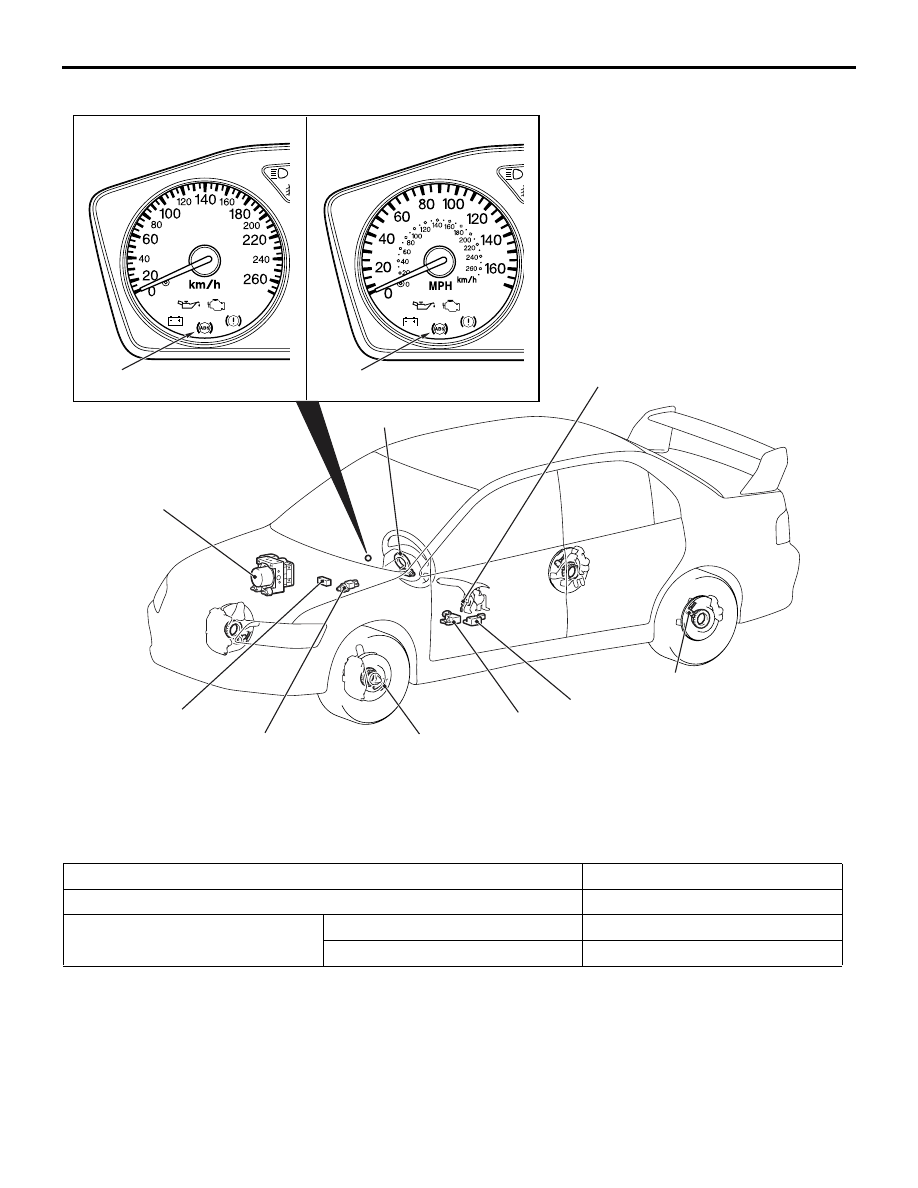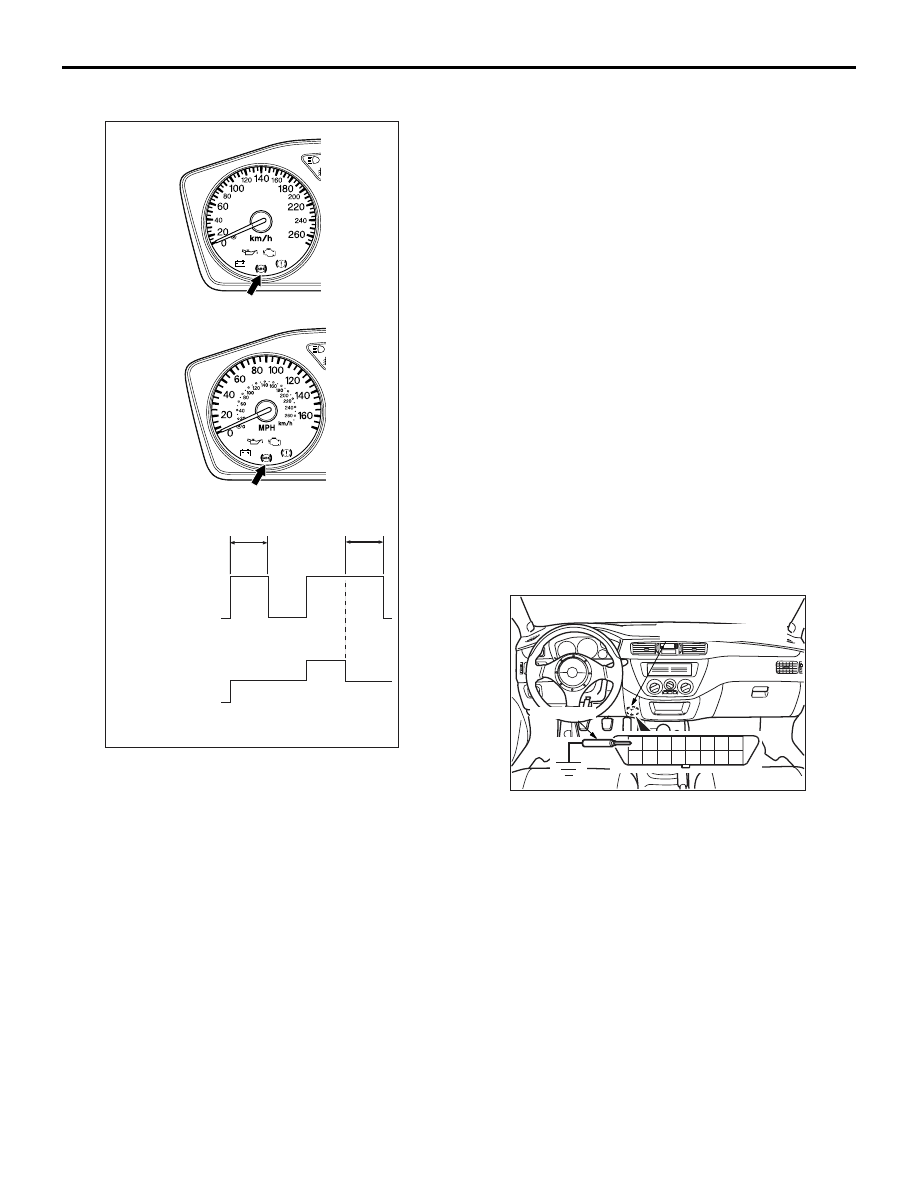Mitsubishi Lancer Evolution IX. Manual — part 493

SERVICE SPECIFICATIONS
ANTI-SKID BRAKING SYSTEM (ABS)
35B-3
CONSTRUCTION DIAGRAM
SERVICE SPECIFICATIONS
M1352000300685
AC310670
Wheel speed sensor
AC
<R.H. drive vehicles>
<L.H. drive vehicles>
Wheel speed sensor
Lateral G-sensor
Longitudinal G-sensor
Steering wheel sensor
Stop lamp switch
Parking brake switch
Hydraulic unit and Brake
modulator (ABS-ECU)
ABS warning lamp
ABS warning lamp
Diagnosis connector
Item
Standard value
Wheel speed sensor internal resistance k
Ω
1.24
− 1.64
G-sensor output voltage V
Stationary Vehicles
2.4
− 2.6
Arrow facing downward
3.4
− 3.6

SPECIAL TOOLS
ANTI-SKID BRAKING SYSTEM (ABS)
35B-4
SPECIAL TOOLS
M1352000600794
Tool
Number
Name
Use
MB991502
M.U.T.-II sub assembly
Checking the ABS
(Diagnosis display using
the M.U.T.-II)
MB991955
A: MB991824
B: MB991827
C: MB991910
D: MB991911
E: MB991825
F: MB991826
M.U.T.-III sub-assembly
A: Vehicle communication
interface (V. C. I).
B: M.U.T.-III USB cable
C: M.U.T.-III main
harness A (Vehicles with
CAN communication
system)
D: M.U.T.-III main
harness B (Vehicles
without CAN
communication system)
E: M.U.T.-III
measurement adapter
F: M.U.T.-III trigger
harness
Checking the ABS
(Diagnosis display using
the M.U.T.-III)
CAUTION
M.U.T.-III main harness
B (MB991911) should be
used. M.U.T.-III main
harness A should not
be used for this vehicle.
MB991529
Diagnosis code check
harness
Checking the ABS
(Diagnosis display using
the ABS warning lamp)
B991502
MB991910
MB991826
MB991955
MB991911
MB991824
MB991827
MB991825
A
B
C
D
E
F
DO NOT USE
MB991529

TROUBLESHOOTING
ANTI-SKID BRAKING SYSTEM (ABS)
35B-5
TROUBLESHOOTING
STANDARD FLOW OF DIAGNOSTIC
TROUBLESHOOTING
M1352011100641
Refer to GROUP 00, How to Use Troubleshoot-
ing/Inspection Service Points
.
NOTES WITH REGARD TO DIAGNOSIS
M1352012600207
1. The ABS is a system which controls the brake
pressure by means of the operation of the ECU.
Accordingly, the following symptoms may occur at
times, but these are a sign of normal ABS
operation, and do not indicate a malfunction.
2. For road surfaces such as snow-covered roads
and gravel roads, the braking distance for
vehicles with ABS can sometimes be longer than
that for other vehicles. Accordingly, advise the
customer to drive safely on such roads by
lowering the vehicle speed and not being too
overconfident.
3. Diagnosis detection condition can vary depending
on the diagnosis code. Make sure that checking
requirements listed in the "Comment" are satisfied
when checking the trouble symptom again.
MB991348
Test harness set
Checking the G-sensor
Tool
Number
Name
Use
MB991348
Phenomenon
Explanation of phenomenon
When the engine starts, a knocking sound can be heard coming
from the engine compartment.
This sound occurs as a result of system
operation checking, and is not a
malfunction.
• Sound of the motor inside the ABS hydraulic unit operation.
(whine)
• Sound is the generated along with vibration of the brake
pedal. (scraping)
• When ABS operates, sound is generated from the vehicle
chassis due to repeated brake application and release.
(Thump: suspension; squeak: tyres)
This is the sound of normal system
operation, and is not a malfunction.
Shocks are felt if the brake pedal is depressed when driving at
low speed.
This is due to system operation checking
(starting-of check when the vehicle speed
reaches a certain number of km/h) and is
not a malfunction.

TROUBLESHOOTING
ANTI-SKID BRAKING SYSTEM (ABS)
35B-6
ABS WARNING LAMP INSPECTION
M1352012000249
Check that the ABS warning lamp illuminates as fol-
lows.
1. When the ignition switch is turned to the "ON"
position, the ABS warning lamp illuminates for
approximately 3 seconds and then switches off.
2. When the ignition switch is turned to the "START"
position, the ABS warning lamp remains
illuminated.
3. When the ignition switch is turned from the
"START" position back to the "ON" position, the
ABS warning lamp illuminates for approximately 3
seconds and then switches off.
NOTE: The ABS waning lamp may remain on until
the vehicle reaches a speed of several km/h. This
is limited to cases where diagnosis code Nos. 21
to 24, 41 to 44, or 53 to 55 have been recorded
because of a previous problem occurring. In this
case, the ABS-ECU keeps the warning lamp illu-
minated until the problem corresponding to that
diagnosis code can be detected.
4. If the illumination is other than the above, check
the diagnosis codes.
DIAGNOSIS FUNCTION
M1352011200819
READING DIAGNOSIS CODES
WHEN USING THE M.U.T.-II/III
Refer to GROUP 00, How to Use Troubleshoot-
ing/Inspection Service Points
.
WHEN USING THE ABS WARNING LAMP
1. Turn the ignition switch to the "LOCK" (OFF)
position.
2. Use special tool diagnosis code check harness
(MB991529) to earth terminal number 1
(diagnosis control terminal) of the diagnosis
connector.
3. Turn the ignition switch to the "ON" position.
AC311051 AB
Approx. 3 s
Approx. 3 s
ABS
warning
lamp
Ignition
switch
Illuminated
Not
illuminated
START
ON
ACC
<L.H. drive vehicles>
<R.H. drive vehicles>
AC211895
1
2
3
4
5
6
7
8
9 10 11 12 13 14 15 16
AB
MB991529
Diagnosis connector

Нет комментариевНе стесняйтесь поделиться с нами вашим ценным мнением.
Текст